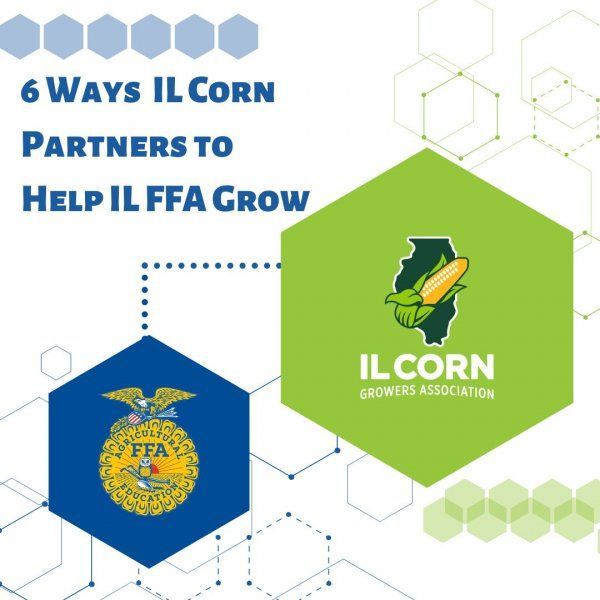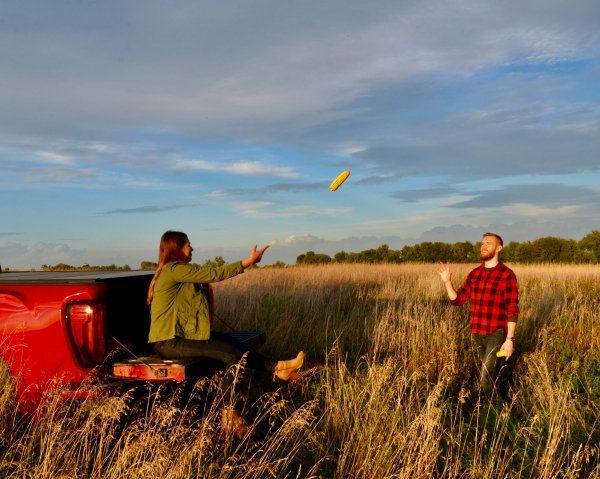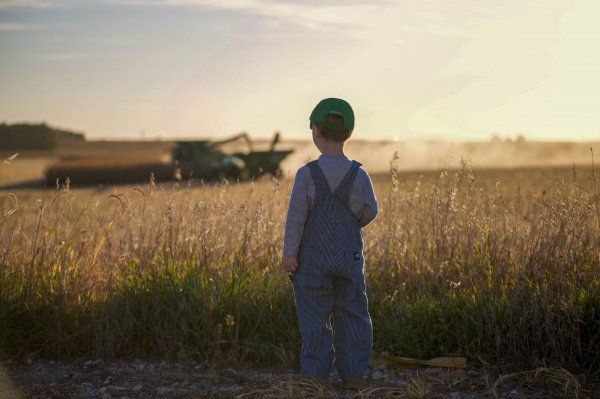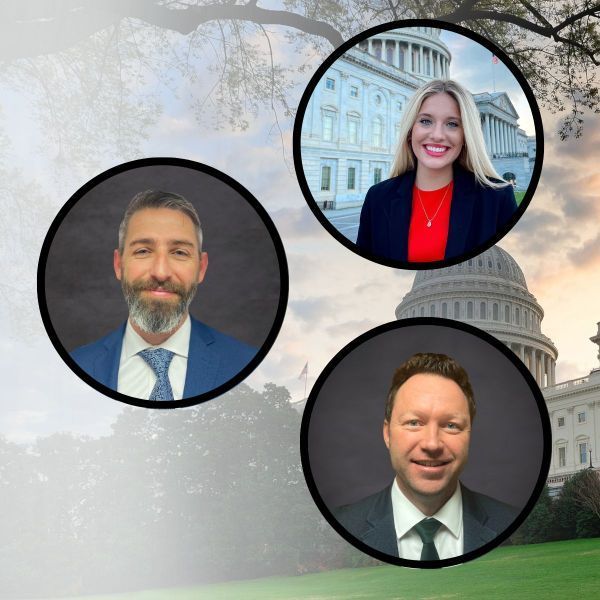Featured Article

February 22, 2023
IL Corn positions farmers to create and capture profit opportunities, preserve their independence, and prosper for generations. There’s one overarching investment that never disappoints, and that is the time and resources spent partnering with the Illinois FFA . Here are six areas of involvement IL Corn had with the FFA in the past year: 1. Sponsor a car for FFA officers The Illinois FFA officers visit every high school FFA chapter during their tenure and they need a reliable way to get around. IL Corn provides them a highly-visible, cobranded vehicle that runs on clean-burning renewable-energy, corn-based ethanol. It’s flashy in it’s own way! 2. Sponsor polos for majors and section presidents In 2022 IL Corn funded co-branded, business casual polo shirts for all majors and section presidents. These bright gold and blue shirts gave a unified presence at large functions like the IL State Fair Ag Day breakfast and made traveling through Washington D.C. an attention-grabbing affair. It doesn’t take many gold-colored polos to pass by a stranger, before they notice the FFA emblem and say “I was in FFA when I was in high school, and, Hey! I see you’re from Illinois!” What an easy conversation starter! 3. Introduce FFA students to policy and advocacy in D.C. Speaking of Washington, D.C., it is IL Corn’s privilege to sponsor a group of 36 FFA students on our summer fly-in to Capitol Hill. IL Corn provides travel, lodging and meeting opportunities for the group so they can participate in a similar capacity as our own board members. The students attend policy briefings, congressional visits, and NCGA Corn Congress. High-level officials, like the Secretary of Agriculture, have even paused their day to meet with our FFA group and grab a quick selfie. There are sightseeing opportunities as well as invaluable life lessons collected along the way. such as learning to travel by air and navigating the D.C. metro stations. 4. Offer internships and internship assistance Last semester, IL Corn welcomed FFA Section 9 President, Peter Metivier, to our office for a communication internship for high school class credit. Peter worked on marketing and communications during his fall semester while also attending school. In the past, IL Corn has also provided need-based grants for past FFA leaders who have secured professional opportunities in Washington D.C. This housing stipend benefits all of us, by planting our rural roots into the Capitol city. 5. Create learning and fundraising opportunities, like our water testing program We look for opportunities to provide discussions in the classroom and create awareness about farm conservation in the state. This past year we rolled out a new Water Testing Challenge for all FFA chapters in Illinois to participate (plans for 2023 are underway). This challenge had them working with farmers to collect samples from different water sources to analyze. The winners of this challenge were grateful to get involved in real agriculture issues and received a monetary award. 6. Cooperate on other important initiatives like FFA Foundation work The FFA Foundation works to secure resources for the future of agricultural education and FFA. An IL Corn staff person sits on the Illinois FFA Foundation Board of Directors, helping to guide the future of the organization via fundraising opportunities and incentives for FFA chapters to participate most fully in local resource drives. It’s easy to see how the FFA motto has lived on through generations of leaders – many of whom sit on our current Corn boards: “Learning to Do, Doing to Learn, Earning to Live, Living to Serve”. IL Corn is a proud supporter of Illinois Association FFA. Learn more about IL Corn Growers Association goal to support Illinois FFA.

February 20, 2023
Precision Conservation Management (PCM) is thrilled to welcome Andrew Hiser as a specialist this February. He will be serving farmers in Sangamon, Christian, and Macoupin counties. Andrew was raised on his family’s farm near Monticello, IL and earned his BA in Technical Systems Management from the University of Illinois College of ACES. He has a broad agricultural background working in grain elevator operations, grain merchandising and logistics and ag machinery sales. He also owned and operated a clam and oyster farm in coastal South Carolina. He currently resides in Petersburg, IL with his wife and two sons. Andrew enjoys lending a hand on his in-law’s farm and taking his boys camping and fishing any chance he gets.

February 16, 2023
Last week, United States Congressional members from Illinois supported corn farmers and the ethanol industry as they encouraged the Biden administration to approve the use of ethanol blends , year-round. Illinois Congressmen were joined by elected officials throughout the Midwest, as they called upon the Environmental Protection Agency and the Office of Management and Budget to respond to nine Governor requests to remove the 1-psi volatility waver and expand the use of E15. Illinois Democratic Governor J.B. Pritzker was a member of the initial group of eight governors who submitted their request last April. In 2018, Illinois was third in the United States for ethanol production capacity. In the same year, ethanol production added $46 billion dollars to the United States Gross Domestic Product and provided Americans 365,883 jobs. A response from the EPA and OMB is long overdue, as Governors throughout the Midwest first submitted their requests in April of last year. The Clean Air Act states the organizations must respond, “…not later than 90-days after the date of receipt of a notification from a Governor." “Therefore, this rulemaking should have been completed in July 2022 and unfortunately, we still have no regulatory certainty for our fuel retailers, fuel blenders, or biofuel producers,” said the Congressional Letter . Tammy Duckworth (D-Ill.), Mike Bost (IL-12), Nikki Budzinski (IL-13), Darin LaHood (IL-16) and Eric Sorenson (IL-17) were among 31 members of the house and senate to sign the letter in bipartisan support. Policy members cited national security, economic impact, and lower vehicle emissions as incentives for ethanol expansion. “Higher blends of ethanol like E15 are a common-sense solution to lower the cost for consumers at the gas pump and to lower vehicle emissions,” said the letter. “As we gear up for the summer 2023 travel season, we have the production and distribution infrastructure to meet consumer demand for this lower cost and environmentally friendly fuel option.” “By working swiftly to finalize the Governors’ requests, you will bring much needed certainty to our corn growers, fuel retailers, and consumers to enjoy the clean-burning, lower cost benefits of year-round E15 through the 2023 summer driving season.“

February 16, 2023
Family farmers and free trade agreements are behind the wheel Exporting goods is big business for Illinois, built on highly effective freight logistics like rail and river systems that allow for more efficient, climate friendly transportation. I n 2018, Illinois was the sixth largest export state in the nation, accounting for 7.6 percent of the Illinois GDP . Hundreds of thousands of jobs in our state rely on this big business. In the last marketing year Illinois shipped about 46 percent of the corn grown in Illinois out of state, mainly destined for international export from the Gulf of Mexico. Since 2019, the top international markets for Gulf US corn are Mexico, China, and Japan. Illinois exports more corn than any other state, with Minnesota and Nebraska ranking second and third. And it isn’t just corn. Value-added corn products like corn-based ethanol, the dried distillers grains produced during ethanol production, pork, beef, and poultry are also leaving the state. Including these and all other agriculture product exports, Illinois ranks third in the nation. All told, vibrant relationships with international customers and free trade agreements that place a framework of trust and agreement around those relationships are vital to the health of the Illinois export industry. The United States has signed free trade agreements with 20 countries – markets that consistently buy more than half of all U.S. exports of corn, sorghum, barley, ethanol, distiller’s dried grains with solubles (DDGS), corn gluten feed/meal and other co-products. For the 2019/2020 marketing year (September 2019-August 2020), U.S. FTA partners imported 53 percent of all U.S. grain in all forms exports at 53.4 million metric tons, equivalent to 2.10 billion bushels. Considering how critical exports are to Illinois agriculture and our economy, we should all be concerned about the potential disruption in trade from our top partner. Mexico is largest export market for U.S. corn, a natural trading relationship built on free trade agreements like the North American Free Trade Agreement (NAFTA) which entered into force in 1994, and the updated U.S. Mexico-Canada-Agreement (USMCA) which entered into force on July 1, 2020. The USMCA includes provisions that require any trade restrictions be based in sound science and risk. The proposed ban on genetically modified corn imports appears to be a politically motivated protectionist effort, based neither in science nor risk. It is critically important that the U.S. government hold all free trade partners to the terms of the free trade agreement. Many Illinois corn farmers grow non-genetically modified and other specialty corn to serve higher value markets. U.S. farmers are capable and willing to grow whatever the market demands, as long as their operations allow it and there is a financial benefit to do so. The proposed ban does nothing to leverage the power of the free market to achieve its stated goals. Also significant and often not considered outside of the industry, agriculture is an annual process. The seed to be planted in 2023 was purchased in the fall of 2022. Soon, the seed will be in the ground, and it seems unlikely that the U.S. and Mexico will have come to a resolution. What then is a corn farmer to do with the crop, investment already made and plants already growing, when harvest comes and a significant market is gone? Corn exports, and their successes and failures, have significant impacts for the Illinois economy and especially Illinois’s rural communities. This business deserves more than a passing interest in times of crisis.

February 14, 2023
National Corn Growers Association has been doing a photo contest for the past 9 years and IL Corn is thrilled to congratulate this year’s Illinois farmer winners. With eight different photo categories, here is a glimpse of the Illinois winners: Category: Conservation 1st place: Taylor Bernhard Photo: Cover Crop for Conservation Taylor is a teacher and a farm wife in Sugar Grove, IL who enjoys the outdoors and photography.

February 9, 2023
Illinois farmers get real about industry challenges and urgent needs With only two percent of the population actively farming, but that same population empowering a multi-million dollar impact to the Illinois economy, it can be difficult to connect to Illinois farmers and to understand what they perceive as threats to or opportunities for their family businesses.

February 1, 2023
With fewer lawmakers representing rural America in Congress and in the state legislature, it is more important than ever for farmers to be well represented in Washington D.C. and at our state capitol in Springfield. As our organization continues to lead on issues that impact agriculture and renewable fuels, IL Corn is continuously looking to enhance our advocacy efforts . "I'm so glad we can be an association that farmers look to for leadership on key policy issues impacting corn,” said Illinois Corn Growers Association President Matt Rush. “As IL Corn continues to work for farmers at the highest legislative levels, we aim to best represent Illinois farmers and their concerns.” Meet IL Corn’s staff members, working to represent you in Washington, DC and Springfield, IL! Director of Public Policy: Bradley Stotler Brad Stotler is a Peoria native that graduated from the University of Illinois Urbana-Champaign in 2003. He came to IL Corn from Rep. Darin LaHood’s (IL-16) office where he was the Congressman’s District Director for 7 years. Prior to that position, Stotler lived in Washington D.C., working in government relations and on Capitol Hill. He was a lobbyist for the fuel marketing industry, working on transportation bills and renewable fuels issues. While on Capitol Hill, Brad worked on staff for Rep. Tim Johnson from Champaign, and started his career as an intern for Rep. Ray LaHood from Peoria. Public Policy Manager: Russell Orrill Russ Orrill was born and raised in western Illinois (Frederick, IL) on an 80-acre row crop farm overlooking the Illinois River valley. He attended Western Illinois University, majoring in Political Science and Marketing and playing baseball. While attending college, he spent his downtime as an intern for former State Senator John Sullivan. Upon graduation, Russ worked as lead Policy and Budget staffer for the Senate Agriculture Committee under Senate President John Cullerton. In 2014 he accepted a position with Illinois Farm Bureau as a state lobbyist, and in 2018 transitioned to GROWMARK, Inc. where he served as a Market Development Representative specializing in Mergers and Acquisitions. Policy Communications Manager: Haley Bickelhaupt Haley Bickelhaupt was raised in Mount Carroll, Illinois on a grain and Hereford cattle operation. She attends the University of Illinois at Urbana-Champaign, where she majors in Agricultural Communications/Journalism. Haley is a member of 4H House, National Agricultural Communicators of Tomorrow and the National Hereford Association. During the summer of 2022, Haley interned with Agri-Pulse Communications in Washington D.C. where she worked in print and audio journalism helping cover the Farm Bill, crop insurance and high input costs. Haley looks forward to combining her passion for agriculture, policy and communications in this role. She will work at IL Corn part time until her graduation in May 2023.
Articles
2026
2025
2024
2023
2022
2021
2020


